Sustainability Tour - Week 6: Environmental protection can be big or small, it can start with children, and needs more strength to support
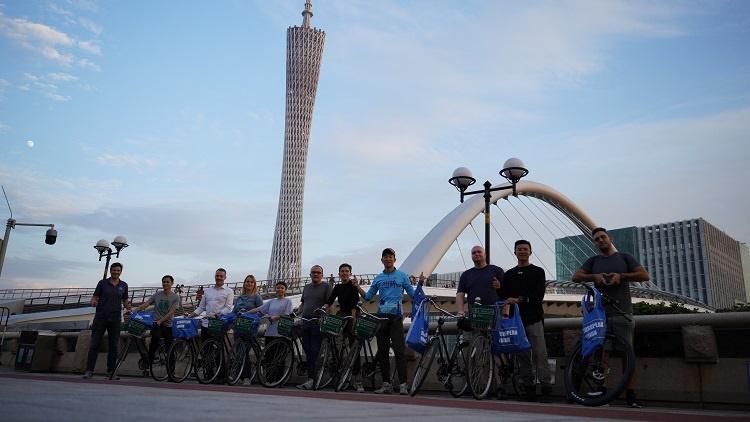
The Sustainability Tour is coming to an end. In the last week, Rose traveled to Kunming, Yunnan Province, to visit the magical stone forest, and even took the role of teacher to interact with students, while Steve travelled between the warm Guangzhou and cold Beijing to explore more about sustainability.
Project: Cooperation on Karst Research between Slovenia & China
Location: Kunming, Yunnan Province
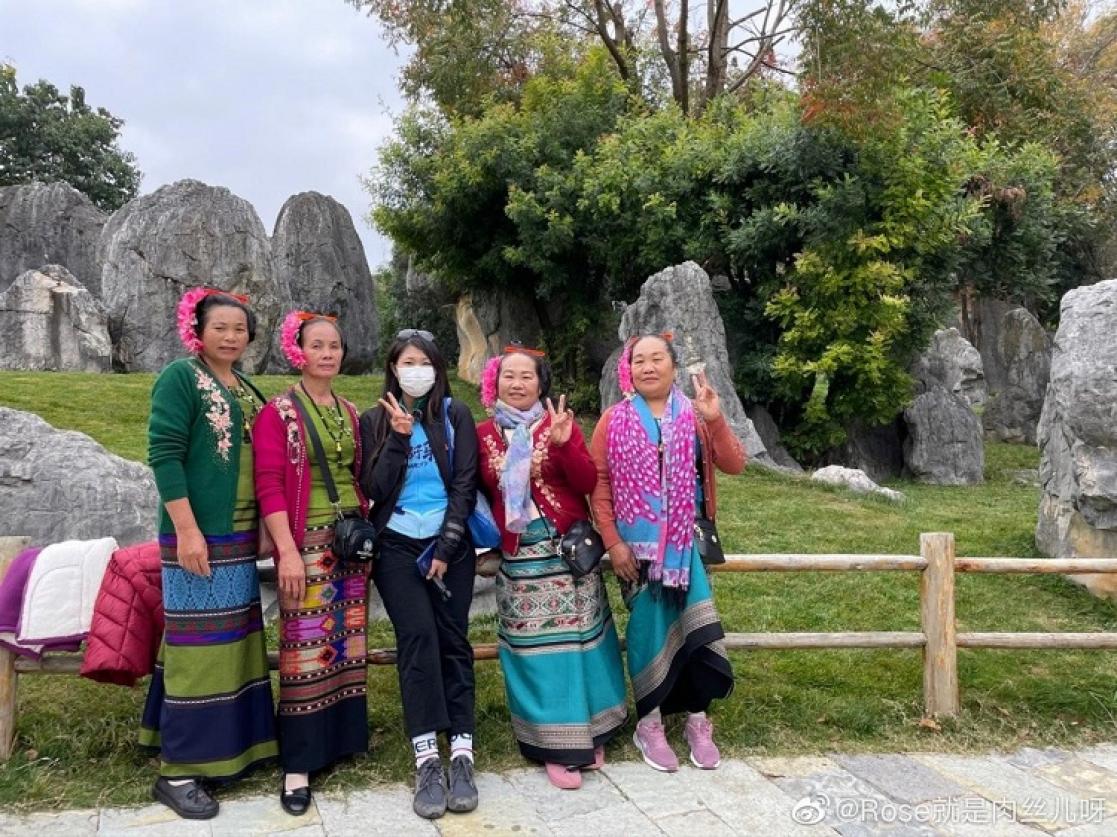
Invited by researchers from both the Slovenian and Chinese karst research projects, Rose visited the scenic "Spring City" of Kunming this time to visit the Stone Forest scenic area. Dr. Natasa Ravbar, Associate Professor at Karst Research Institute, Research Centre of Arts, the Slovenian Academy of Sciences, said that the Slovenian Institute for Karst Research and its Chinese colleagues have been working together for more than 20 years. The Chinese representative, Dr. Liu Hong, an associate researcher at the School of Resources, Environment and Earth Sciences of Yunnan University, also said that China and Slovenia have been working together on karst landscapes since 1995. The research results obtained have been published in the form of books, such as South China Karst I and South China Karst II.
Regarding the relationship between karst landscapes and human beings, Dr. Hong Liu believes that there are three main aspects. First, karst landscapes are widely distributed on the earth for 12% of the earth surface without snow or ice; second, karst landscapes are rich in mineral resources. Due to special environmental factors, many pre-glacial plants of the fourth season are preserved and mineralized. They are rich in water resources, with more than 25% of the earth's population drinking from the rich water sources of karst landscapes. Therefore, the conservation of karst landscapes is crucial.
Armed with valuable knowledge shared by these two professionals, Rose embarked on a trip to the Stone Forest, in search of the famous Elephant Perched Stone Platform. With the unique configuration of karst landforms, the Kunming Stone Forest scenic area has an extraordinary charm, with each stone pillar presenting a magical form. The huge stone forest itself is like a maze, taking Rose on a good search for a while. Finally, after a thousand turns and getting lost, Rose finally found the elephant perched on the stone platform, whose posture is very similar to that of a real elephant, Rose was marveled at it.
After studying karst landscapes and visiting the Stone Forest, Rose was amazed by the magic of nature and how important it is to protect karst landscapes and our precious water resources. The proper use of water resources is one of the most important topics in the joint research project between Slovenia and China.
Project: Yunnan Low Carbon School Pilot Project (supported by the European Union and Humana People to People Spain)
Location: Kunming, Yunnan
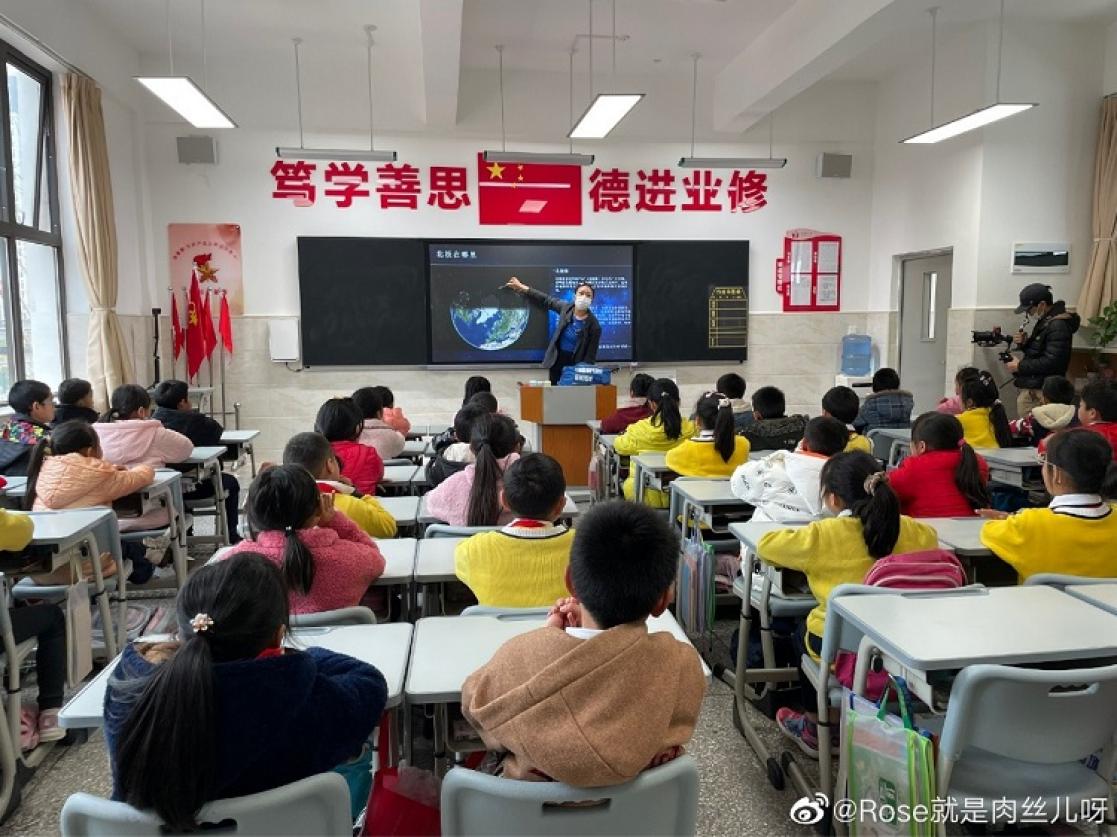
In Kunming, Yunnan Province, Yunnan Low Carbon School Pilot Project, supported by the European Union and Humana People to People Spain, covers a wide range of student groups, including kindergartens, elementary school, secondary schools and universities. Now, let's follow Rose's footsteps and see how the pilot project educates children!
In contrast to her previous visits, Rose, a former member of the North and South Pole Expedition Team, turned into an elementary school teacher to give a class on Arctic stories to the children at Hongqi Primary School in Wuhua District, Kunming. Rose also taught the children to start with little things around them to protect the environment, such as using less disposable chopsticks or turning off the tap.
After bidding farewell to the children at Hongqi Primary School's Shang Yue Campus, Rose rode for 1 hour and 50 minutes to Yihuiyuan Primary School in Panlong District, reducing carbon emissions by 6.3 kg. When Rose arrived, the project team was teaching a lesson about carbon dioxide to a Grade 1 class. In order to give the children a better understanding of what carbon dioxide is, the project team gave them a taste of soda to let them feel what it is like to acidify carbon dioxide through the unique taste of soda.
Mr. Wang Jianguo, Yunnan Low Carbon School Pilot Project Promoter, said that tasting soda is a direct way for children to use their tastebuds to feel what carbon dioxide would taste as if it melted in seawater. Because many children do not really like the taste of soda, they will think whether fishes and sea creatures would like the taste.
Rose then visited a higher grade class. Children were drawing to convey their knowledge about low carbon and environmental protection related to the school, the community, and humanity as a whole. Mr. Qichao, Yunnan Low Carbon School Pilot Project Officer, felt that the lessons would allow more students to learn about low carbon and climate change and share these ideas with more people around them.
Rose also went to the Xinying Third Kindergarten in Panlong District, where teachers encourage children to take care of nature. An interesting aquaponics water recycling system in the garden attracted Rose's attention. Ms. Huang Wen, a kindergarten teacher, said that the aquaponics water cycle system brought a lot of joy to the children, who in turn led to their parents, who in turn led to a community. Lv Xuelian, a parent of Xinying Third Kindergarten student who works in Panlong District Economic Trade and Investment Promotion Bureau, thought that, it is important to let children know that humans have a great role in the natural environment and should not produce excessive car exhaust to pollute the environment. Through education, children also know that environmental protection could start from themselves, for instance, sorting waste can help reduce environment pollution.
The EU - Humana People to People project - Yunnan Low Carbon Schools Pilot Project has planted the seeds of environmental care in children’s mind. Rose went to Xishan School of Kunming No.1 Middle School, where environmental initiatives are also implemented. Two students introduced to Rose how rain water is treated and reused in the school. Ms. Liao Li, the School’s low carbon project leader and Mr. James Fu, the deputy director of the General Affairs Office, explained how students use plants to create artworks and how the school uses eco-friendly design and natural light to save energy.
Rose made her last and crucial stop in Kunming to Southwest Forestry University, a key partner of the EU – Humana People to People project, to hear Mr. Mao Yueqiang, Director of the Campus Facilities Maintenance Center of the Logistics Group of Southwest Forestry University, introducing the school's use of solar heating pump model and water stations, which helps saving millions of dollars annually. Mr. Chen Yiting, a wildlife and nature reserve management major, said that through the "Carbon Footprint" program of the EU project, he learned that ordinary people can create considerable carbon emissions unconsciously, and that carbon reduction should start from ourselves. Ms. Chen Yuanshu, Director of the Office, Science Department of Yunnan Biodiversity Research Institute of Southwest Forestry University, said that the university is educating students about environmental protection in all aspects, hoping to plant a green seed in them to make changes in their future work and life.
From Rose’s observation of all sites she has visited, the EU - Humana People to People project has made remarkable achievements in Kunming, Yunnan Province. Mr. Michael Hermann, who describes himself as a German "young man" of more than 50 years’ old, is the chief representative of the International Humana People to People Movement (Switzerland) Yunnan Representative Office (HPP YNRO) and has been in China for 16 years. He believes that students and teachers are still not well aware of climate change, and therefore the EU project - Yunnan Low-carbon Schools Pilot Project - designs projects with the goal of raising awareness and response to climate change among more than 70,000 students and teachers in more than 300 schools in Kunming. "The project has been running for more than a year now and has achieved so much that the Yunnan Provincial Department of Education has even issued a red-head document encouraging schools in Kunming to participate in the project.”
Michael Hermann also showed Rose the logo of the Descendants (后裔行动) of the project - "The mythical Descendant (后羿) raises his bow, but this time it's not the sun he's shooting at, it's CO2 (carbon dioxide)." - and a small app called "Carbon Footprint", which helps a person record how much carbon emissions he/she produces. "The project promises to reduce carbon emissions by 15% in 4 years, helping people to know and change their behavior, and truly understand that ‘A green mountain is a golden mountain’.”
Ms. Liu Xi, the project manager of the EU's Yunnan Low Carbon Schools Pilot Project, said that the EU – Humana People to People project is an unprecedented large-scale project and has put a lot of pressure on the staff to coordinate with schools, but the project has received official support and many positive responses from schools.
Learn more about this project: http://www.hppchina.org.cn/article/index/category/?id=30
Project: EU Guangzhou Environmental Cycling Tour
Location: Guangzhou, Guangdong Province
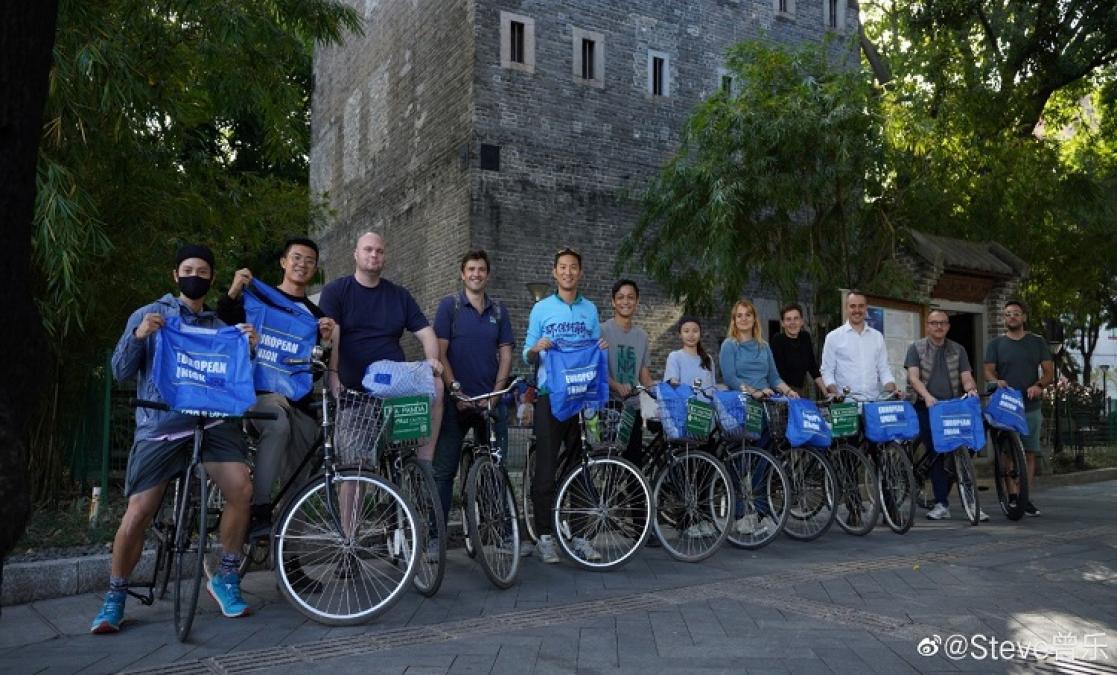
Steve continues his cycling tour of Guangzhou, this time with friends from the European Union Member States consulates in Guangzhou. On a modified second-hand bike, for a 2-hour, they rode 7km to visit some of Guangzhou's sustainable and culturally relevant sites.
The first stop was the once industrially developed Donghao Chung. In the past, there were many factories discharging sewage on this site, which deteriorated the environment and caused a stench. And now after renovation, Donghao Chung has become astonishingly lush and green. The second stop of the cycling tour was a used-clothing store established in 2019. It evolved from an online studio to a physical store and wishes to promote sustainability.
At the second-hand used-clothing store, Steve showed his excitement about a sustainability event related to used clothing in Shanghai that he visited. According to a study from Sweden, each piece of clothing is worn on average only 4 times, while clothes are designed to be used about 100-200 times. In other words, the use of clothing is too low. The Shanghai event has generated an atmosphere of sustainable use of clothing, which made Steve feel great.
A participant from Berlin shared his story. Every winter or spring, he and his wife would go to large flea markets where many parents sell used clothes and he and his wife could get a whole closet full of clothes for their five-year-old. Kids grow up so fast that it is not worth it to buy new clothes every year. So reusing clothes is not only sustainable, but also very cost effective. His view is exactly what the second-hand used-clothing store hopes to convey - "stylish, cheap, and friendly to the environment".
Through this ride, EU diplomats and friends in Guangzhou have expressed their views on sustainability. For instance, Daniel said that he liked Donghao Chung the most, the greened river became endearing under the concept of sustainable development. There is a participant who liked the second-hand used clothes store the most, which made him learn about the environment pollution by the fashion industry. As for the cycling trip itself, Whitney said that she liked cycling the most because she rides on a daily basis, which is more environment-friendly and economic. There are other people who enjoy being able to ride with friends from all over Europe and China. Rebecca even made a long speech, saying she was happy to join the EU sustainability Tour. Sustainability is part of her daily routine, whether to use a reusable cup, cycling to work or using reusable bags.
Finally, Steve shared a short story about himself. When he first came back to China, his life was very simple, with daily routine of work, transport and at home. He could not find a sense of belongingness in the city. It was not until a friend suggested that he could ride his bike to-and-from work that Steve finally opened the door of a more sustainable life for himself. Steve felt that he was riding through the crowds, traffic, life and fireworks. His destination became clearer and the scenery was within his reach. He felt an ability to feel from head to toe, and a more direct contact with the surrounding environment.
Project: Conference on EU-China Energy Cooperation
Venue: Beijing

Back in Beijing, Steve was invited to a conference on energy cooperation between the EU and China. He faced the cold wind to travel from Sanlitun to 44 Guanghua Road in 22 minutes, reducing his carbon emissions by 1200 grams. At the conference, Steve met with Octavian Stamate, Counsellor for Energy and Climate Action at the EU Delegation in China.
The project presented a paper that can contribute and provide conclusions and recommendations based on how China can develop clean energy grids. The EU and China face the same challenges, and both sides are trying to better integrate renewable energy and provide consumers with more clean energy. The EU-China Energy Cooperation Platform is one of the flagship projects of cooperation between China and China in the energy sector and energy policy.
The EU-China Energy Cooperation Platform is more like a network of government stakeholders from different research institutions as well as from the business sector, coming together to discuss energy policies, to give recommendations and conclusions, to help the EU and China to be able to support each other to achieve their respective goals, and to be very relevant in accelerating the transition to clean energy. Because how national energy systems are designed and managed is a matter of concern for every citizen. Proper design and management is essential for a cooperative optimal solution, which means a cleaner, greener, low-carbon sustainable system, which is the ultimate goal.
Learn more about this project: http://www.ececp.eu/en/
Project: “Dreams of Europe and China” Children's Art Exhibition – 2021 EU-China Together in Protection of Biodiversity
Location: Beijing
After lunch, Steve and his friends found the “Dreams of Europe and China” Children's Art Exhibition, featuring paintings by European and Chinese children with the theme of biodiversity. The children's paintings were full of interesting aspects of biodiversity through their eyes, such as birds flying in the sky, fish swimming in the water and even plants on the land, reminding us of the need to pay attention to the protection of nature. Some paintings were about friendship and solidarity, showing five children standing hand in hand on a rainbow bridge, signifying the bridge of friendship between European and Chinese children.
Steve really liked a piece of artwork from an 11-year-old Latvian child that showed a variety of small animals in a beautiful natural landscape with the caption "The nature is alive ......for now", as if to remind people to continue protecting biodiversity.
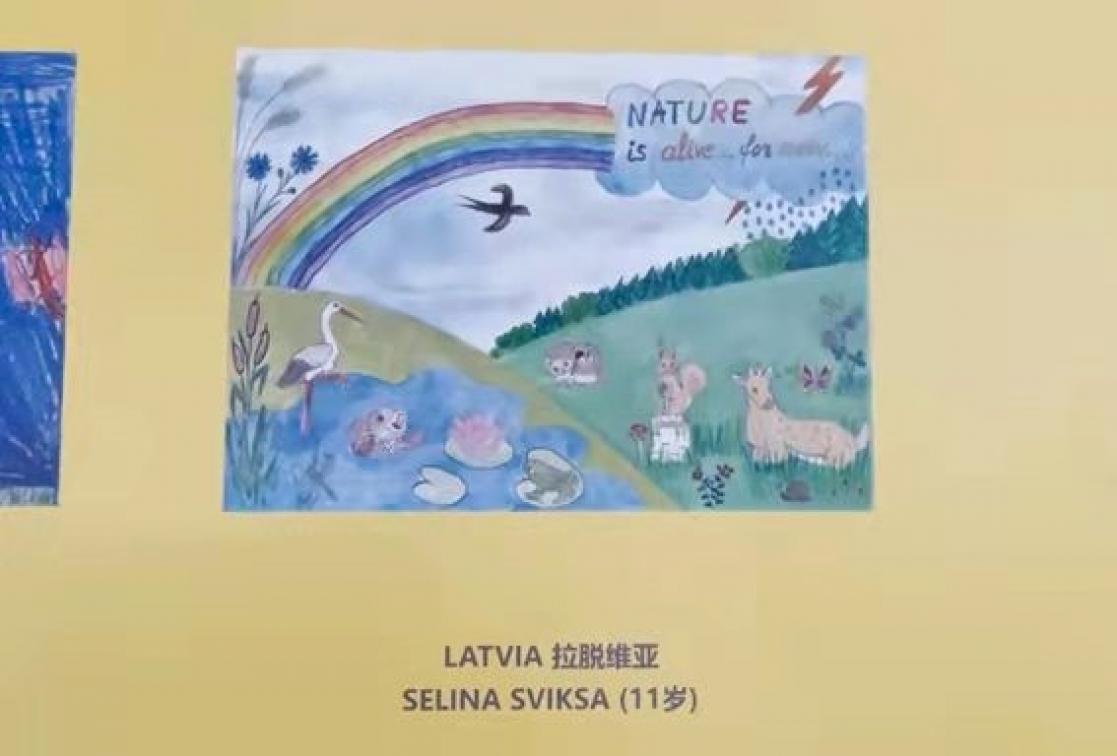
The drawing competition and exhibition started in 2011 and has been held annually. In 2021, it took place in several cities in China including Beijing, Changchun, Qingdao, the ancient city of Pingyao in Shanxi Province and the food village of Xianyang in Shaanxi Province.
Learn more about this project: http://mengxiangzhongou.com/
Project: 100% renewable energy for Budweiser Brewing Company
Location: Ziyang City, Sichuan Province
Is there a craft brewery that works on 100% renewable electricity? As soon as Steve entered the Budweiser campus, he was attracted by a special tree. The tree was planted by Mr. Jan Hoogmartens, Belgian Ambassador to China, who visited Budweiser in June this year, and Mr. Jan Craps, Co-Chairman and CEO of Budweiser Asia Pacific, as a tree of friendship, low carbon and sustainability. At that time, Mr. Jan Hoogmartens and Mr. Jan Craps had an in-depth conversation about how to work on carbon neutrality and how to do low-carbon and sustainable business.
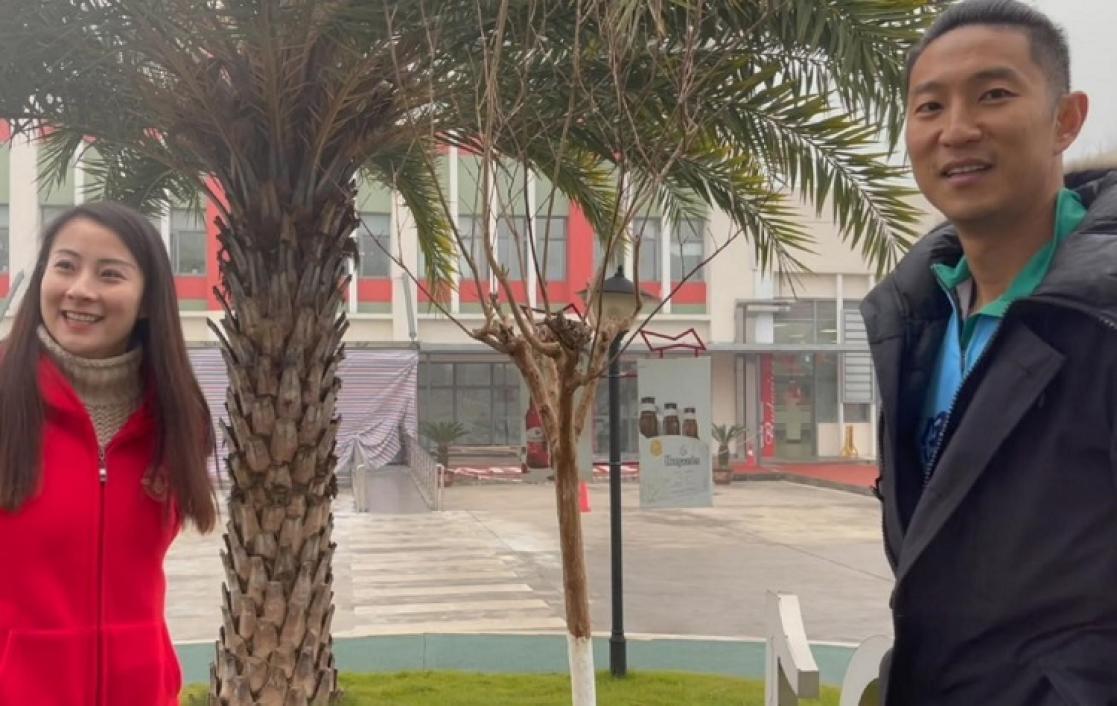
Budweiser advocates sustainable production. The brewery's annual energy consumption is decreasing rapidly year by year, with some process changes to control energy savings. In 2021, it runs on 100% "green power". Budweiser believes that the global greenhouse effect is getting worse and this is a huge threat to human survival. Therefore, it seeks a continuous reduction of energy consumption and carbon emissions as a contribution to future generations. At Budweiser, energy conservation initiatives can be seen everywhere. Lights in the aisles turn on only when people walk by and go off automatically when no one is around. Water consumption has dropped from 3.9 hectoliters per hectoliter in 2017 (3.90 hectoliters for every 100 liters of beer produced) to 2.4 hectoliters per hectoliter this year (2.40 hectoliters for every 100 liters of beer produced), equivalent to saving 196 swimming pools of water. The sewage from production is treated as medium water and provided to the city for watering plants and trees or cleaning roads.
Budweiser also recycles glass beer bottles through its distributors and reuses them after they have been cleaned, in a continuous cycle to save resources. To reduce carbon dioxide emissions from fermentation during beer production, Budweiser also recycles and purifies the carbon dioxide.
Sichuan is Steve's hometown. It brings so many memories of his childhood and the beautiful environment makes him feel a little emotional.
Learn more about this project: https://www.ab-inbev.cn/mediaGalleryDetail.php?id=227
The Sustainability Tour has officially come to an end and the closing ceremony was held in Beijing on 14 December. Yet the cooperation between the EU and China in the field of sustainability is not over. Both sides will continue to cooperate in the field of environmental protection, seeking to ensure a better future for upcoming generations.
